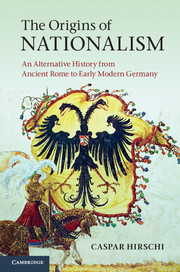Book contents
- Frontmatter
- Contents
- Figures
- Preface
- 1 Introduction
- 2 The modernist paradigm: strengths and weaknesses
- 3 Foundations of a new nationalism theory
- 4 Killing and dying for love: the common fatherland
- 5 Competing for honour: the making of nations in late medieval Europe
- 6 The nationalist transformation of borders and languages
- 7 Humanist nationalism
- 8 A German Emperor for the German people
- 9 Nation and denomination
- 10 Conclusion
- Bibliography of works cited
- Index
3 - Foundations of a new nationalism theory
Published online by Cambridge University Press: 05 June 2012
- Frontmatter
- Contents
- Figures
- Preface
- 1 Introduction
- 2 The modernist paradigm: strengths and weaknesses
- 3 Foundations of a new nationalism theory
- 4 Killing and dying for love: the common fatherland
- 5 Competing for honour: the making of nations in late medieval Europe
- 6 The nationalist transformation of borders and languages
- 7 Humanist nationalism
- 8 A German Emperor for the German people
- 9 Nation and denomination
- 10 Conclusion
- Bibliography of works cited
- Index
Summary
The benefits of a defined territoriality, the politically unifying impact of ecclesiastical unity, the contribution of two geniuses, Bede and Alfred, the stabilising of an intellectual and linguistic world through a thriving vernacular literature, the growth of the economy and of an effective professional royal bureaucracy, all these are contributive to a firmly affirmative answer to ‘Was England a nation state in 1066?’
Adrian Hastings, The Construction of Nationhood, 1997Some of nationalism’s psychological building blocks and fundamental behavioural qualities, such as collective territoriality, solidarity based on kinship (real or imagined), and hostility towards outsiders, can be found among humans at every stage of historical development as well as among many non-humans such as wolves and chimpanzees.
Aviel Roshwald, The Endurance of Nationalism, 2006It has turned out much easier for specialists on earlier periods of history to criticise modernists for their historical myopia than to offer an alternative account of equal substance. They are as united in their rejection of modernist theories as they are divided in their historical location of nationalism’s origins. Some declare early medieval England the first nation state; others see it all beginning with the Bible and take the ancient Jews for the fathers of nationalism; some only speak of a pre-modern ‘ethnic’ prologue leading up to the modern nation, while others prefer to speak of pre-modern patriotism turning into modern nationalism; some, including myself, relate the first forms of nationalism to Renaissance humanism, and others treat it as an anthropological constant in many ways similar to animal behaviour.
Thus, many anti-modernists today have actually more in common with certain modernists than with other anti-modernists. Still – and this makes things even worse – they tend to be lumped together as ‘primordialists’ by their modernist opponents, a term reflecting the general confusion about constructivism, as it implies that arguing for pre-modern forms of nation formation is incompatible with a constructivist approach. So the ongoing dominance of modernists in nationalism studies owes a lot to the chronic weakness displayed by anti-modernists.
- Type
- Chapter
- Information
- The Origins of NationalismAn Alternative History from Ancient Rome to Early Modern Germany, pp. 34 - 49Publisher: Cambridge University PressPrint publication year: 2011



